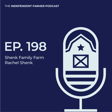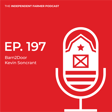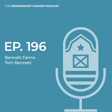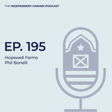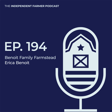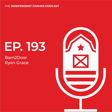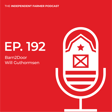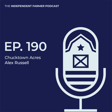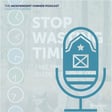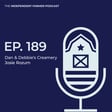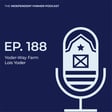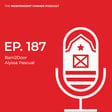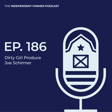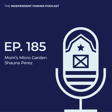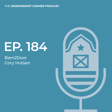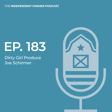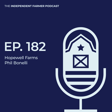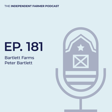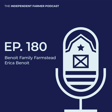Become a Creator today!Start creating today - Share your story with the world!
Start for free
00:00:00
00:00:01

Why Barn2Door? Software for Farmers
In this week’s episode, Alex of Chucktown Acres interviews Janelle, CEO and Founder of Barn2Door, to discuss the history, mission and future of the business. Built to put the power back into Independent Farmers' hands, learn how Barn2Door has expanded its software and services tailored specifically for Farm operations.
For more Farm resources, visit: https://www.barn2door.com/resources
Transcript
Introduction to The Independent Farmer
00:00:10
Speaker
Hello and welcome to the Independent Farmer podcast, the go-to podcast for do-it-yourself farmers who are taking control of their own business, skipping the middleman, and selling direct to local consumer and wholesale buyers.
00:00:20
Speaker
This podcast is hosted by Barn to Door, the number one business tool for independent farmers to manage their business, promote their brand, and sell online and in person. Let's dive in to today's Independent Farmer podcast.
Meet the Hosts: Alex and Janelle
00:00:42
Speaker
Hello, welcome to the Independent Farmer Podcast. My name is Alex Russell, and I am so excited to interview Janelle, the CEO of Barn to Door today.
00:00:54
Speaker
But before we do, let me give you a quick rundown of what Barn to Door is, who I am, and what my relationship is with the Barn to Door team. First off, Barn to Door offers an all-in-one business solution for independent farmers who are cutting out the middleman.
00:01:12
Speaker
They're selling directly into local markets under their own farm brand. From an online store and a website to in-person sales to managing all the parts of the business from inventory tracking to managing daily deliveries,
00:01:27
Speaker
Barn-to-Door software and resources help farmers be successful.
Alex's Farming Journey
00:01:33
Speaker
Okay, a little bit about me first before we get started. I'm Alex Russell, today's podcast host, and I am the owner of Chucktown Acres, a regenerative farm in South Carolina.
00:01:47
Speaker
My farming life started years ago when I interned at Joel Salatin's Polyface Farms in 2016. Not long after that, my wife and i we started a farm right outside of Charleston, South Carolina.
00:02:03
Speaker
We grow forest-raised hogs, pastured poultry, and grass-fed beef. We offer subscriptions and deliveries to our local community, and we also set up at a couple local farmer's markets.
00:02:16
Speaker
We've leased land, we've built a pretty well-known farm brand in our area, we've launched a brick-and-mortar farm store, and we've partnered with a lot of other local farms.
00:02:27
Speaker
It's been an amazing journey, and it's one that I love to share with other independent farmers across the country. I am also a member of the Farm Advisory Network with Barn to Door.
00:02:41
Speaker
Basically, that means that I get to give Barnador feedback as one of their users. I get to give them feedback based off of my experience with the software. And I get to host office hours where other farmers get to ask me any kind of questions they
The Role of Barn to Door
00:02:57
Speaker
want. That program is called Connect.
00:02:59
Speaker
And then I also have the privilege of teaching Barnador's grassroots marketing academy every month. I've been working with Barn to Door for five years now, and I've had the privilege of knowing Janelle for four-ish years.
00:03:16
Speaker
We actually had the pleasure of finally meeting in person at the Sustainability Conference in North Carolina, and I think it was 2022, Janelle. i I am trying to remember.
00:03:28
Speaker
Yeah, I was that. the Yeah, probably when Lucy and I were hanging out talking Spanish words. Yes, that yes that's it. And we think it was 2022. Not totally certain on that.
00:03:40
Speaker
But I've been using the Barnador software since we started our farming operation. So it's helped me with everything from sales to fulfillments, to my brand, to my social presence, and Every aspect of my business has been affected by Varnador.
00:03:59
Speaker
They've connected me to a community of farmers that I would never have met had I not been part of the community aspect on the platforms. They also helped me make my farm website, my farm store. I literally don't know what farming life is like without them.
00:04:17
Speaker
So I am very grateful to Janelle's work with the software and how it's deeply impacted our farming, our business, and then my personal life as a farmer has been made sustainable as an option that I can keep going on because Barnador has helped me so much. So I'm a huge fan and I'm so happy to do anything I can as a farmer to support these guys because they just have made a world of difference for us.
00:04:48
Speaker
And yeah, I've got in here three years ago, i got to do a couple conference presentations with Janelle. We did one in Dallas. We did one in North Carolina And I'm so happy to be a part of this team and so happy to do the podcast today.
00:05:04
Speaker
and love it. We need to put you back on the speaking circuit. You're so good at that. just amazing. And also it's funny. You're going ask me why barn to door. And I'm like, I think you literally just described why barn to door.
00:05:16
Speaker
And that's the end of the podcast.
00:05:20
Speaker
Thanks for joining. um Yeah. If we help you and other farmers like you be successful and crush it out there. Amen. Yeah, I've done a lot of conference calls with other farmers.
00:05:32
Speaker
And if they're brand new and they're wondering if it's worth it, you know, I got to sign up. I do have to pay for the software. I don't know. And I'm just like, dude, you have no idea. Like I still pay for the software, but I don't even think about paying for the software. Like this program has helped me so much.
00:05:50
Speaker
It's not even a second thought about is it willing is it worth it to pay for it. It's obviously worth it to pay for it, and it's going to help you way more than what they charge you. so Last piece of the intro, Janelle.
00:06:04
Speaker
I have a thousand questions for you. i want to dig into your backstory. i want to know why you started Barnador. i want to know why you want to help farmers.
Janelle's Story and Barn to Door's Mission
00:06:15
Speaker
What keeps you motivated?
00:06:16
Speaker
What have the hurdles been? And what advice do you have for farmers on and off the platform? Welcome Janelle. I just did your job.
00:06:28
Speaker
and Yeah. Of the intro. So how did I do? ah You did awesome. Well, you know, it's great because people want to know who the heck you are when we're having this conversation. And I've been asked by folks to do a podcast on Why Barn to Door, including other farmers saying, hey, can you please do that?
00:06:46
Speaker
So really sweet. And it's good to dig in. all right, let's get into this. I want to know just more about your story. i know a little bit, but I bet there's a bunch I don't know.
00:06:57
Speaker
few simple questions right off the bat. So if people have never met you, have never listened to you speak before, tell us where'd you grow up? What did you want to be when you were growing up?
00:07:09
Speaker
Did you study software? Did you have a career in software before? All of that stuff. How did you get to this point when, what was life like for you before Barnador? Oh my goodness.
00:07:20
Speaker
That was like four or five questions in a row, Alex. Yeah, I've got them written down. So if you need help, you can circle back. Okay. I was raised in the Pacific Northwest. I have roots from OG from Montana, primarily some Nebraska, et cetera, but ended up in the Pacific Northwest where my grandfather helped found ah city and it was all farming and agriculture.
00:07:42
Speaker
So I grew up in this lovely pocket of a ton of dairy farmers and then berries. So if you know anything about the Pacific Northwest, it's seafood, a lot of salmon, a lot of berries, a lot of dairy.
00:07:54
Speaker
And so my grandfather had a dairy farm and a chicken farm. So spent tons of time in the milk parlor and, you know, Most of my friends had farms and their families had farms and people milked before school and after school.
00:08:05
Speaker
My summer jobs were very farm-ish. I picked more berries than anybody would care to know. Probably ate that many too. But yes, we used to pick berries all day, every day as our summer jobs.
00:08:16
Speaker
The riding tractor is very normal. My father had a hobby farm then. So we always had huge gardens, animals, chickens, cows, everything else out back. So a lot of wonderful exposure, loved farmers for all of those reasons.
00:08:29
Speaker
Back one of the country, lovely people, salt of the earth. So that's where my affection and exposure grew for farming in particular. You asked about food and what I'm trying to think what I wanted to be when I grew up. I'm trying to remember if i have an answer for that. I think it was an evolution, but I was the kid when little kids played house, I played restaurant.
00:08:49
Speaker
So I think I always had a great affection for food early, early, early on. And I was classic, worked tons of years in restaurants, front and back of house all through the years.
00:09:00
Speaker
And i don't know if you want to know beyond that. I actually got my MBA in the Seattle area. So if anybody knows, that's a very... thick tech ecosystem. So I got great exposure to technology, to business, to food tech, to all of the above. Also got to know the restaurant community there very well.
00:09:19
Speaker
So a lot of good exposure to all of the above in terms of tech, in terms of restaurateurs. I also did an OG food blog for years and years. So a lot of things circling around that ultimately did come together.
00:09:33
Speaker
Yeah. Okay. That's beautiful. So did you have... a career in tech and software before you started this? Or was this like, I know people who do software. I think I could do it.
00:09:46
Speaker
Like walk me through that scenario. Yeah. I appreciate that. When I was getting my MBA in Seattle, it was all the.com everything. Right. So there was a lot I learned and I did, I consulted for quite a few years for a number of businesses, often food tech related, sometimes just tech where I do various kinds of consulting. I also consulted for some really large statewide food commissions like Northwest Cherry Growers, Texas Grapefruit, California Raisin.
00:10:13
Speaker
Just really interesting. And honestly, piggybacked on that with my food blog. Before anybody knew what influencers were, they called them blog ambassadors. Bloggers. Yeah, exactly. So I got great exposure from that to just a litany of food brands across the country as well. So a really great mix.
00:10:31
Speaker
I think the fun... twist to this story is after about 10 years being in food at, well, I should say tech and business, I actually bowed out and went back to culinary school to become a trained chef.
00:10:43
Speaker
don't know if you knew that or not, but anyway, it was very soon after that, that I looked around and my chef friends were trying to source local food from farmers. I was on a consumer, like personal level, always trying to source local food directly from farmers and was sort of in that pocket of people.
00:10:58
Speaker
And it was so obvious that it was, it needed to be fixed because all of us were trying to source direct and it was like Google, it was like Facebook groups, listservs, long, complicated email threads to try to figure out which farm was going to maybe come to town. And so it's like pen, paper, cash check, you know, many touches of email,
Empowering Farmers Through Technology
00:11:18
Speaker
text, everything just to try to procure food.
00:11:21
Speaker
Anyway, net Net of it is most buyers won't go through all of those hurdles, but the demand was there. And I knew that because nine in 10 people prefer local food. So I'm like, it's not a demand issue.
00:11:33
Speaker
And so everybody wants local food, but at the time, you know, farmers were really struggling. And so that was really, you know, 10 plus years ago was the light bulb moment of we have to solve, like, we have to solve this. It's not even an option because these farmers shouldn't be failing and we don't want them to fail. We want them to be wildly successful and then to support and grow these farmers where there's all this demand for local food, ensure their success as farms, and then ultimately continue to grow that as a great option and a viable option from a career perspective and make it turnkey and easy for farmers to move their product, engage their communities and sell consistently.
00:12:10
Speaker
Yeah. It's an unbelievable resource. I still remember when I was in Virginia working at Polyface, I decided to start my own duck business. So I would raise and process meat ducks for like French restaurants.
00:12:25
Speaker
Oh, in the off agony of having to try to sell those ducks to restaurants, I still have PTSD from it because I would set aside six hours a week to make cold calls directly to restaurants.
00:12:41
Speaker
And ah my personality is not the like barge in and be the center of attention kind of guy I'm a quiet you know, slip into the back door kind of guy. And so I'd have to call these restaurants and try to get through the walls and walls of fireproofing that they had to block people from getting to the Jeff.
00:13:01
Speaker
But I had to talk to the chef. And I remember i would just be in agony. I would force myself for two hours every Tuesday and Thursday i and Wednesday.
00:13:12
Speaker
I'd have to call these restaurants and it was so awful. Yeah. And I think I like still remember that innately whenever I get an email, that's like a confirmation email that I sold another $200 on barn to door.
00:13:27
Speaker
And I never even talked to that person and I don't even know who they are and they're buying my stuff. Like, oh, what a relief because I used to have to make every single sale through phone calls, writing down orders, promising I'll be there at this time. i don't even have the chef's phone number yet.
00:13:45
Speaker
And I mean, what a terrible, terrible. It's horrible. Way to do it. And to be honest, the buyers have PTSD too. They don't, that's not how buyers buy. Buyers love farmers, but they don't want to talk to them every single time they want to buy something. And I know that's a rough reality, but buyers today, so the missing link, and you've you've just touched on it is convenience.
00:14:08
Speaker
Like buyers, they want to go through as few clicks and as little friction as possible to purchase the food and then have it fulfilled in a convenient way. And if you can build up a group of buyers buying directly from a farm where it's easy to buy, they can just go online, drop it in their cart.
00:14:24
Speaker
Hit purchase, you know, choose the pickup or delivery that works best for them, whatever that farm might offer. And it's easy. Game over. Because now all of a sudden, I like to say, if you have 100 customers and you require phone calls and emails, maybe you'll be lucky to get one out of 100 that are willing to jump through all those hoops. It's probably more like one in 10,000.
00:14:44
Speaker
Yep. But you get the point. But if it's easy and all i have to do is go online, drop it in my cart, either hit subscribe or purchase. And I've chosen Wednesday because that's what the farmer offers for either delivery or local pickup.
00:14:57
Speaker
I will do that all day, every day because I am the 99... Out of 100 people who prefer local food, but it's the convenience of shopping and fulfillment that's the game changer.
00:15:08
Speaker
And as you know, a lot of farms will come to us like, wow, I first have to build up my customer list. It's like, great. We know how to help you do that. Once you have your customer list, you just have to regularly remind them to buy from you and they will if it's easy.
00:15:19
Speaker
Yeah. If it's easy, if it's easy. Exactly. If farmers like me know how strenuous it is to try to sell to someone who won't just go on your website and buy it, they're like your buddy or someone close by. They're like, can I just text you my order and then just meet you at this unspecific time when you're probably really busy and you don't have time.
00:15:43
Speaker
And like anytime someone comes to the farm and you talk to them, that's 30 minutes to an hour guaranteed. That's for one sale. Nope. And so when people do that, I'm like, please just go on the website or just, we have a farm store. So I'm like, just come during the farm store hours because I don't have just a floppy free hour on a Thursday just to give to you, you know, because you want to spend a hundred dollars on some, whatever, some brisket or something.
00:16:13
Speaker
Well, and the reverse is true. The buyers typically don't have time either, especially those who are like, hey, I'll pay you 10, 15 bucks to drop it on my front doorstep, right? Yeah. And everybody will because they're busy, but they want the food. And so they will pay for convenience.
00:16:27
Speaker
I have to say one thing that's really, really important to Alex before we move on. And it's the mission and the passion and the grit behind growing barn to door because we know and love that when we help farmers remove the middleman and sell direct, we give the power back to farmers, right? Like you get to set your own prices. Now, you know, your own end buyer, you're calling the shots versus, you know, when you start to get into that aggregation distribution model and all of a sudden somebody else owns the buyer, somebody else is setting the pricing and that's very risky for business.
00:17:00
Speaker
And so nothing makes us happier I literally had a call this morning with somebody who was talking to me about some precision egg, you know, whatever for some big egg commodity monocrop.
00:17:11
Speaker
You know, I tried not to go off on them, I i admit. But... and You have no idea who dealing with here. Do you want the ethical issues I have with that? Or do you want, anyway, but but the net net of it is is that's actually very risky. The reason they those monocrop farms have to be so massive and have all the subsidies is because they have no pricing control and they literally put all their eggs in one basket with one crop.
00:17:37
Speaker
Like, you know, one thing goes wrong and you're toast. And so it's just, it's funny, but we actually help independent farmers all across the country de-risk, de-risk their business because now they can sell to wholesale, to retail.
00:17:52
Speaker
They can build up local buyers, many, many, many buyers in their local communities. And they can, in many cases, offer subscriptions to their product. Now all sudden, They have 20, 30, 60, 80% of their sales are recurring revenue every week or month.
00:18:06
Speaker
So this is a game changer, including when you remove the middleman and remove the supply chain, you can maximize your profit. Yep. Right. And so for us, nothing truly makes us happier than so many success stories of farmers taking their business by the horns, if you will, and really leaning in and saying, I'm going to do this and then having wild success.
00:18:27
Speaker
Yeah. And we have to keep in mind that the margins are so tiny for anyone in the food industry, whether it's restaurants, it's fair farmers in this case.
00:18:40
Speaker
And, you know, I've got a couple of people that I do a little bit of wholesale work with. But if you're going to give a food co-op or a grocery store, somebody that you're going to work with on a wholesale basis, a restaurant, and you're going to give them a wholesale discount,
00:18:55
Speaker
You would just have to be really careful with that because you got to know your margins ahead of time before you go ahead and say, yeah, I'll give you 30% off if you take 200 pounds of ground beef.
00:19:07
Speaker
Sure, because your margin might be 30%. And guess what? You just gave that 30% away to a restaurant and you're farming for free and you're not getting anywhere.
00:19:18
Speaker
And it's one of the most amazing things to be able to sell the full price direct to the consumer, when we cut out that middleman, that's 30% more or whatever your numbers it could be 50% more. Yeah. Many times higher income that you're getting to hold onto as a business as profit to then be able to grow your business. Because it seems like a lot of farmers get into this and we have to have the heart to heart price conversation with them because they want their steaks to be the same price as whole foods or their ground beef to be the same price as Walmart or something.
00:19:53
Speaker
And it's like, guys, you have to understand you're going to lose money. That food is artificially subsidized to be made cheaper than it actually is. Don't match those prices. You're not getting government subsidies as a little farm, right?
00:20:08
Speaker
So you have got to make sure that you are running your numbers, charging your real price, giving yourself profit to be able to grow your farm and stuff like barn to door, farmers markets, farm stores, all of these things allow us to be able to go direct to the customer and make that difference and be able to charge a full retail price rather than going through someone else and basically giving away all of our profit to someone else to bank.
00:20:40
Speaker
I know it's like we're on our double soap boxes again on, you know, giving the talk. good stuff. There's a lot of passion. There's a lot of passion. All right. so my next question for you is why did you choose technology to help farmers instead of other ways?
Technology's Impact on Farming
00:20:57
Speaker
I'm sure being in the food industry yourself,
00:21:01
Speaker
there was probably a hundred different ways. You could have started your own co-op. You could have started your own grocery store. You could have started a business that helps farmers connect with restaurants only.
00:21:13
Speaker
What was the thing? what like What happened? Was there a conversation you had with somebody where they you were like, don't I don't just want to help these farmers out. And then the idea sparked to have a software. I mean, this is a very specific idea that is working.
00:21:30
Speaker
When did the spark happen? And did this happen as a progression where you tried a few things and then adjusted it? Or like, tell us the story behind building Barn to Door.
00:21:41
Speaker
Yeah, I think it was a little bit of both. I understood food hubs and saw a lot of incredible groups trying to be supportive of farms. Many of them actually had grants. And i also talked to a lot of those same food hubs and groups that would say, hey, it's great. But then if you don't get the grant, the bottom falls out.
00:21:57
Speaker
And you know if you don't get the grant again, i should say, then the bottom falls out. And that impacts farmers who then, again, are left holding the bag. They don't have that end buyer relationship because, again, somebody else was doing that aggregation and distribution.
00:22:10
Speaker
I played a little in that space enough to figure out that when farmers use an aggregator and distributor of any kind, whether it's a food hub or a small marketplace, online or offline, et cetera, that for a farmer, it was good because it moved product. Like, okay, they could count on, hey, X number of whatever from this large contract would get moved. But as I said earlier, That can be very risky when all of a sudden the contract falls through.
00:22:39
Speaker
Or in the case of aggregation distribution, they might deliver what was purchased through that aggregator distributor, but they always would continue on and keep selling direct to chefs and friends and family and consumers because they would make more money.
00:22:56
Speaker
So while it was useful, it still counts as a sales channel to use a grocery store or marketplace or food hub or any of those, but it eats away at the profit margin. So it ends up being an expensive channel. better than the, I always say it's better than the compost pile, right? Because you want to move product, but yes but that's fine. It's neither here nor there. There's a lot of use and value in that.
00:23:18
Speaker
But I saw... the value that brute force effort farmers were making to manually manage direct sales through phone, text, email, pen, paper, cash check, setting aside to your point hours to try to do cold calls and do all of this manual non-farm effort, you know, to do the marketing and sales, which again, you have to do if you want to maximize your profit and have the most control over your business. And so it was very clear to me and there was certainly light bulb moment and through that evolution of,
00:23:50
Speaker
These farmers prefer to sell direct and or if we give them an opportunity for that to be really turnkey and as easy as possible, even though at the end of the day, they're still the ones that have to do The marketing, because it's your own brand and you have to actually build up your own loyal customers to your farm brand, not any aggregator or distributor, that if we could empower that model, it would change the lives of all those farmers and encourage farming even more so and basically save the future of, well, provide an incredible option for the future of food in so much as there's actually nutrient dense products.
00:24:24
Speaker
options and variety if you can decentralize food essentially and give the power back to the farmers. I mean, if there's anything else, that's the mission and the power and the passion, which is to give the business back to the farmers, to give the decisions back to them, to give the farmers the option and the optionality and the information and data to make good decisions about their business and to maximize their profits.
00:24:46
Speaker
And of course, if you're growing a business as a farmer, it takes effort up front. Like you said, you can't not pay for a software. You know, you have to actually invest Yeah. And I saw them doing all this manually and I'm like, okay, software can solve the manual minutia and administrative overhang of farmers trying to sell direct brute force with nothing, with no software helping.
00:25:07
Speaker
But the second punch, and this is a one-two punch. It has to be convenient for buyers or they will not buy. Yep. Again, you can do all the right things, even use the software, everything else. But unless you make it easy for them, for the buyer to order and get the food, including without talking to anybody and with a few clicks of a button and with a credit card, then all of a sudden, now the masses will buy from you.
00:25:32
Speaker
You just opened up your whole world. That's why you can say you woke up the next day and you sold a couple hundred more dollars of food to somebody you never met because it was so easy. They saw a quick description of what you're doing. They love it. They want it. It's done. They make quick decisions.
00:25:47
Speaker
Yes. Yeah. This is all making me remember when we started our farm, it was June of 2020. And the COVID pandemic was like, we were still in the early stages, but everyone was so freaked out that no one was going anywhere. The farmer's markets were shut down.
00:26:06
Speaker
I knew farming friends. Yeah. that were shutting down their operations. Like they were closing their businesses while I was opening mine.
00:26:17
Speaker
Yeah. And it was crazy because I saw these people are like, he raises pigs and chickens and cows. And he's shutting his business down. But those people were all going through distributors.
00:26:32
Speaker
Yep. Risky. No one, no distributing companies were doing anything. The grocery store shelves were empty. The supply chain got totally screwed up.
00:26:43
Speaker
And so that was one of the main things that I saw that gave me this huge like aha moment where I said, we have to be able to sell direct to these people.
00:26:55
Speaker
And if we can't go anywhere, if we can't go to the this farmer's market, we'll never meet anyone. So we have to have an online thing like this. This is this whole thing. Let's go online. Let's do it. And so that's when we started looking for a we were like, hmm.
00:27:12
Speaker
We need like an online service where they'll build us a
Adapting to COVID-19 with Direct Sales
00:27:16
Speaker
website. They'll build us an online store. They'll help us learn how to get in front of customers. People can go on our website.
00:27:24
Speaker
They can like order stuff. It'll be really easy and amazing for people. and That probably doesn't exist, but let's go, let's Google it anyway. And so we start searching for what Barnador is.
00:27:37
Speaker
And we found out there are a couple of options, none of them even close to what Barnador offers. And so even before we launched our own business,
00:27:51
Speaker
We knew we needed this. So we signed up for Barn to Door before we even launched our LLC as a business. Amazing. And we were like, we have to do this because I'm seeing all these other farmers closing their doors and they're good farmers. Like they're yeah they're regenerative, they're sustainable, they have great products, but they all went from probably 90% wholesale through distributors and middlemen And then COVID hits ye and they try to switch to like, hey, I'm going to post on Instagram that you can come to my farm on Tuesdays and we'll just set up a cooler at the farm.
00:28:30
Speaker
it did not work. Like that was not nearly convenient enough for people. And it was this huge, drastic change that these businesses had to make.
00:28:42
Speaker
And unfortunately, a lot of them closed down and I was able to learn by observing that, be like, we have to have an easy online store.
00:28:53
Speaker
And now I just tell people, if you go to my website, go to the online store and it's basically the Amazon of meat. Like everything is super easy to click on.
00:29:04
Speaker
We have subscriptions on there. We have bundles. We have some a la carte options. You just select what you want. pick whether you want us to bring it to your house or you want to meet us at a pickup location and that's it and people are like that's it yeah yeah that's it no friction like oh we already do that for like our everything whatever if i don't have a tool i'm gonna go buy it online i'm not gonna go to a store anymore i'm gonna go online And so it's such a, I'm just so grateful that you did this because it's such a massive resource for us. And I think that having Barn to Door helped to launch our business and we're way further past where we would have been without it.
00:29:50
Speaker
Guaranteed for sure. And so I just love what you did. And is there anything else you want to tell us about the beginnings Oh, the beginnings.
00:30:01
Speaker
The stories of people, like you said, because they were selling with distributors and they were these amazing regenerative farms because they didn't have their own list of, you know, their own loyal customers. That's really motivating to us, to what we do here Brontador.
00:30:14
Speaker
We don't want any of those farms to struggle. That's the motivating factor, right? And for us here, that just means we keep making our platform better, more robust. Obviously talking, that's why we have a program with farmers like yourself of like, tell us what you need. What can we improve?
00:30:30
Speaker
You know, we're investing in building what you need from a software and resources perspective, tons of resources. Business owners, we need feedback. you know, from the people that use our products.
00:30:43
Speaker
I'm always asking the people on our meat CSA, is this good? Are you liking what you're, cause it's a farmer's choice. I literally pick what they get every week. Like, yeah did you like that?
00:30:54
Speaker
Was that okay? Streamline it. They don't care. And most of the people are just like, yeah, just bring me food. Fine. And then every now and then I'll get someone who was like, I didn't really love that sausage or that cut of meat. I've never used it before and I'm scared of it.
00:31:10
Speaker
And so any kind of feedback we can get is awesome. That's why I love being part of the Farm Advisor Network because I see how valuable that is to my business. So if I can offer that to another business that I use and love like Barnador, I'm all in.
00:31:26
Speaker
I love that. Okay, I got another question. Can you... I don't want to put any other software platforms under the bus, but I want you to be able to highlight what makes Barnador so special and what makes Barnador different than other platforms and your favorite special features that Barnador has because there's a lot going on here that you guys do.
00:31:51
Speaker
I mean, there's tons of different things. So want to know, what sets you guys apart and what are your favorite features that really make you guys special? What sets us apart of that we're purpose built for farmers.
00:32:03
Speaker
I mean, at the end of the day, other options out there tend to be what we call horizontal platforms, not vertical platforms. What that means is they, if you want to throw up an online store, there's a lot of different places you can go to do that, but it's not built for farmers. It's not built to ensure that a farmer can offer wholesale and retail pricing for the same item or different unit sizes for the same item.
00:32:27
Speaker
or be able to readily put in offer different like specific cutoff times in order to place your order by sometimes farmers need that to be two or three days before because they're going to go do a big loop over the weekend.
00:32:40
Speaker
So every little thing that we're building outside of just the basic like, hey, people can shop, they can put in their credit card pay, like the basics of commerce, you know, we're always considering what does a farmer need across the categories of farms from, you know, dairy, protein, produce, microgreens, like you name it. What do they need to be successful in selling? How do they sell today? And so we build for that, which is if a farmer's selling eggs, they can sell a dozen eggs. They can sell a case of eggs.
00:33:11
Speaker
They can put different prices. They can have obviously those different unit sizes and With barn-to-door system, those eggs will actually, the inventory will subtract in real time, including if somebody's buying the farmer market and somebody else is buying online at the same time.
00:33:25
Speaker
So we have a really robust inventory tracking system that considers or I should say is agnostic to different prices and unit sizes because that's what farmers need.
00:33:36
Speaker
So we look across those farms businesses and we're like, hey, how do we make sure that we cover all the bases in terms of their needs selling? And the other one, i mean, I already mentioned different prices. The other one that's a big deal is sell by weight.
00:33:47
Speaker
So the other systems are not going to build for sell by weight. And the farmers need the ability to do not only that, sell by weight both online and in person, but make sure that when they do sell by weight, inventory is still tracked accurately.
00:34:02
Speaker
So there's a lot of those type of nuances that are really critical. Another one we like to mention is subscriptions. So it's really lovely because...
Barn to Door Features and Tools
00:34:12
Speaker
It's been a game changer for so many farms using barn to door in particular to offer subscriptions to their food because it's recurring revenue. Like how great to go into the next month and 80% is already pre-sold. Like it's just miraculous.
00:34:24
Speaker
And then you can begin to think about growth or what else you want to do with your business. But farmers might want to offer year round subscriptions to say grass fed beef or eggs or dairy, but there's other farmers who offer seasonal subscriptions that Literally, it might be May 3 to October 24.
00:34:42
Speaker
And so with Barn to Door, again, same thing. We built natively, like built it from scratch for farmers to be able to offer seasonal subscriptions or time-based subscriptions according to what they want to offer. By the dates, you can pre-sell everything.
00:34:58
Speaker
months and months ahead of time. So a lot of those considerations, you know, I could go on and on, but we just get really enthusiastic about this is purpose built for farmers. It is why we win. It's why it's turnkey for farmers.
00:35:10
Speaker
They don't have to literally try to duct tape, dip, tie and Velcro together multiple things online and offline to manually do all of this. We want to be essentially the barn or the home for farmers in terms of their business. Like this is my business system done.
00:35:26
Speaker
I can manage customers, marketing, inventory, orders, finances, logistics, delivery day with Barntador, and it's easy. I think I said all my favorites, but what I think comes across a lot when our success team is talking to farmers is their love of time savings, especially managing delivery day, the ease of having a pick list, a pack list, one button, and you're printing your labels, one button, and you can populate a routing app if that is of interest.
00:35:55
Speaker
So I think it depends who you talk to, what their favorite piece is. But we, again, are incredibly enthusiastic and bullish on being purpose built for farmers from our POS to online and to everything in between.
00:36:10
Speaker
Yeah, I think there's so much in there that you mentioned that can be taken for granted that we don't realize. As someone who's been using the software for five years, ah sometimes I catch myself taking that stuff for granted, like,
00:36:25
Speaker
I can set a cutoff date. Like my cutoff date was yesterday at noon. I know the exact time that I can send my delivery list over to my driver and tell him, all right, there's no more orders are going come in.
00:36:37
Speaker
I know for a fact that's going to happen. I can set all this stuff that's really specific fulfillments for if people are going to be picking up at this pickup location or if people are ordering Thanksgiving turkeys or, you know, I have all these things on my store.
00:36:54
Speaker
So my customers just see the items. But on the back end of this thing, I have all these specifics of when you can order this, when I want you to order that, where this can go, the cutoff for this.
00:37:05
Speaker
And then, like you said, those pick and pack lists are an extreme lifesaver. Once you get past like, I don't know, 10 orders a week that you're packing, 10 to 15,
00:37:17
Speaker
Think about trying to track every item. Like we did 65 deliveries this Wednesday. Like today we had 65 orders go out. If I had to track every single item off of 65 orders that are all anywhere between 75 to $200 each, what a nightmare if I had to actually go in there and physically figure that list out.
00:37:40
Speaker
But I think the subscriptions have been a financial lifesaver for us and the Pick and pack list is an organizational time-saving thing that I literally just click one button and it prints this whole thing out.
00:37:56
Speaker
If you don't have the software, you know how laborious it is to have to figure those logistics out. So I just want to give major props to you guys for that because I mean, I can be eating a burrito and the guy that's going to load my orders for me, his name's Andrew.
00:38:15
Speaker
Andrew can text me and say, Hey, I need the pick list. I can eat a burrito and print the pick list at the same time and have it to him in a minute and 30 seconds. And then show up on a podcast because your deliveries are all handled, right? Yeah.
00:38:28
Speaker
Yeah, it is like the time-saving aspect of just that one feature alone is like so crazy. And you guys have so many features that you've really, really thought through what are the struggles that farmers are having with their sales, their online presence, their fulfillments.
00:38:50
Speaker
and how can we And there's so many little things that can pop up that can be so annoying that cost you 20 minutes here, an hour and a half there. And you guys have literally gone through. and thankfully, because we can give you advice, you're like, we can let you guys know as farm advisors, hey, I was doing this and I got a little hiccup here and you guys fix it, bam.
00:39:10
Speaker
And we're back to smooth sailing with fulfillments and sales. It's so awesome. I just, I'm a fan boy. So and on the subscriptions thing,
00:39:21
Speaker
I mean, we didn't do subscriptions for the first two years and I sure wish we had because the recurring revenue that you get from those, the guaranteed funds that you know, literally help you plan out for years to come because you know you're going to have guaranteed orders.
00:39:39
Speaker
If you're just selling bolt beef and you only want people to buy whole cows, you don't know when you're going to have three orders come in and then you might not have anything for three months. And then it's so inconsistent and scary.
00:39:54
Speaker
You don't really know exactly what to plan for for the future. So you're probably going to play it on the safe side and then under order your feeder steers or your piglets or your broiler chicks for the year.
00:40:07
Speaker
And because you don't have that recurring revenue set up, you're going to be a little bit more inconsistent in how you order and what you prepare for. And then you're going to be insecure about, well, I don't know what next year is going to look like, but I already know what next year is going to look like for us because we have these amazing people that are signed up for our program that don't even think about it anymore.
00:40:33
Speaker
Like they put their credit card in one time and for the next, every Wednesday from here on until the future, they just are, no, they're going to get an amazing package of meat and eggs delivered to their door.
00:40:45
Speaker
And they only had to do it one time. They're so fortunate. I know. And they're healthier. I know they're healthier. ah Exactly. Exactly. Because when we only have one day a week or some farmers only do once a month or something like that, let's say your customer runs out of food.
00:41:01
Speaker
They're not going to drive up to your farm for the meat for dinner that night because they're super busy and they forgot to order from you. So they're going to go to the closest grocery store and they're going to buy from them instead.
00:41:18
Speaker
Unless you are constantly getting in front of them, making yourself known. This is stuff we talk about in the grassroots marketing class and then getting them on subscriptions so they don't have to think about it anymore. Their freezer is always full and you are supplying them with this great stuff and they don't have to go to a grocery store in a pinch. They've already got you loading up their freezer Match their eating cycle.
00:41:44
Speaker
How often do they eat? yeah You know, right? yeah And you just keep showing every time they need to buy pork or chicken or eggs, just have that be your subscription offer once a week, every other week, once a month, whatever makes sense. But so that you're literally the choice or delivering, you know, that product as often as to match their eating, match their eating of that product is pretty exciting.
00:42:05
Speaker
I will say it's interesting. i I think next week I'm scheduled to do a podcast with another of our fans who has, She does subscription chickens. So she constantly has that recurring order, but then as another sort of sales item, you know product line, she offers pork, but she doesn't do too many of them. So she sells those half and whole hogs.
00:42:26
Speaker
But the beauty of that is she has the recurring sales with subscriptions and then the half whole hogs with Barnes and Ore, and you know this, but was one of the first things we actually built on the platform was the ability for farmers to take deposits from on their half whole hogs, on their quarter half whole cow. And if you've ever talked to a farmer who offers, you know, sells the product that way, getting a a genuine like $100, $200, $300, $400 deposit is a lot more meaningful than some verbal, sure, I'll buy from you six months from now.
00:42:58
Speaker
And then all of a sudden you're bringing your product to the butcher and the customer isn't showing up. So like, how do we solve that? Well, we help farmers, we built this. So farmers can take Actual deposits, they can even make them non-refundable, $100, $200, $400, whatever, on any of those half-whole hogs, half-whole cows, whatever.
00:43:15
Speaker
And then line them up to the butcher date. And then when they bring, I loved it because she I think she had a newsletter out. She was like, I've sold 62.5 or something like that, right? She knew exactly because bar into door on the inventory will show you down to the quarter half what you've sold.
00:43:32
Speaker
But the beauty of it is, is when those hogs go to market in their wage, she can go back to the back end of her system, enter in either the final weight or final price. It's up to her. And it will auto charge the customer less deposit and send that customer invoice.
00:43:45
Speaker
So you're not having that awkward, I'm hunting them down for the check conversation with your customers, which is not what you want. You want to be saying, hey, isn't that pork awesome? Yeah.
00:43:56
Speaker
Like, you know, change the conversation even because you're letting technology solve a problem. And that's what we're here to do, right? Is solve those problems, remove the friction from a farmer selling to a buyer locally, make it easy for the farmer, make it easy for the buyer and create that win-win and everybody's the better for it.
00:44:17
Speaker
Yeah. And especially if Those farmers are getting to the dollar what they deserve for the weight of the animal that they put on. I mean, this is something as farmers that we think about constantly is how much do my animals weigh?
00:44:34
Speaker
And so... If you can have the confidence of knowing I'm going to get a hanging weight from my butcher and then I can price my product based off of that exact animal that they're going to be getting and I'm going to get every dollar for that animal that I put the sweat and hard work into.
00:44:52
Speaker
That's just an amazing feature that they're going to know. I'm not just going to charge a flat price and hope that I win or don't lose that much. You get to actually charge exactly what that animal really weighs and when you're selling those Especially the big animals, right?
00:45:09
Speaker
Yeah. There's a lot of farms and we actually have some farmers that are accountants in their other life. And they're like, you know, three to four pound bird charge 25 bucks, four to five pound bird charge 30 bucks.
00:45:20
Speaker
Because by the law of averages is if you sell a hundred birds, you're fine, right? Like you're net even in terms of how that passes through. And again, that's easier especially just with birds. But yes, when you're talking like whole half hogs, holy smokes or cows or lamb or sheep or goat, whatever. Yeah. You're going to care a lot more about just making sure. And that's fine. That's great. People know that going into that purchase.
00:45:43
Speaker
These are live beings. And yeah even if you have a scale on your farm that you're going to weigh in beforehand, or even if you can just eyeball it like me, I have hanging weights for steers that could be anywhere from 400 to 600 pounds.
00:45:59
Speaker
Yeah. And that's thousands of dollars of difference there. I know. Yeah. It's a drastic difference. We do a game show where farmers guess the weight of items. You guys would, you would crush that. Wouldn't you? Oh, well, sometimes I've been very wrong.
00:46:17
Speaker
Ah, that's good. I have a lot of practice on being wrong. So maybe I could have a decent guess. Maybe we'll do it when we do an on-site farm conference one day. We'll have some fun with that. Yeah, that would be fun.
00:46:29
Speaker
Okay. Is there underutilized gym on the Barn-to-Door platform that a lot of farmers should be using more so that they can get the most out of Barn-to-Door?
00:46:43
Speaker
I have an idea for
Scaling and Marketing for Farmers
00:46:44
Speaker
one. Oh, i want to I actually want to hear your idea. Well, it's email marketing. automate Yeah, order the automated order reminders. And automated connecting MailChimp to Barnador.
00:46:56
Speaker
And we've talked about the spiel with email marketing a hundred times. i don't want to belabor the point. Yeah, listen to any former podcast with Alex from Chucktown Acres, including attend his Grass-Bed Marketing Academy on Barnador, and you will learn the importance of email marketing. Yes. yes We have a direct integration with MailChimp.
00:47:14
Speaker
We actually have a pretty high usage rate of that, Alex, but I do think anytime you use something, there's always more there, right? And so there's a lot of, like, we talk about how important it is to collect emails and grow your email list. And what's cool is once you get your customer list to a threshold where you know you can consistently sell products, sell out, et cetera, that's awesome. You still have to babysit your customer list, kind of always be adding to it because there will naturally be attrition or people that, you know, move or do the next thing. But Get annoyed at your emails and quit.
00:47:46
Speaker
You must keep engaging them, right? You have to keep engaging that list then. And there's a lot of ways to help yourself get that done efficiently. And as you know, with the MailChimp integration, you can automate emails. You can automate welcome emails. You can automate an email to go after six months if somebody hasn't made a purchase.
00:48:05
Speaker
Through barn to door, you can actually set up, I'd have to look at the exact percentages, but automated order reminders, which is not a fancy newsletter. All it is, and you can do it separately for wholesale versus retail. I love this feature where you can just set up, hey,
00:48:20
Speaker
once a week at this time or once a month or once every other week to my wholesale or whatever, you just say, hey, on a Thursday, because you know that's when they like to order. Every Thursday, just be like, ping, don't forget to order. Here's a big, huge button to click through to my online store.
00:48:35
Speaker
Because that can just go on in the background. like You're doing your touches, your regular order reminders, which everybody expects now, if you've ever seen your email. That just goes on in the background. And then any newsletters you're pushing out are just you know this beautiful frosting on the cake, right? Because they tend to be a little more tuned in to like what's happening on the farm now or what just showed up in the store. They can be a little more real time.
00:48:59
Speaker
But I would say that's kind of a fun feature. I secretly hope that more and more farms use subscriptions because nothing makes me happier than when a farmer gets recurring revenue. I also love when farmers offer single bundle boxes so people can try it and then subscribe. So like the same box, just to like a- Same box.
00:49:17
Speaker
Trial- Yeah, yep, yep, yep. We're the only POS built for farmers. And so what happens is the things that we have built that are purpose-built for farmers get pulled through to the POS experience. So the sell-by-weight, the tracking of inventory across both online and a person, the ability to toggle between wholesale and retail pricing in person, and we add an automatic email capture on POS. So on and on and on in terms of that being unique.
00:49:43
Speaker
And yes, so those are all platform like the investments we've made in the software itself. When you start to unpack the resources and the information and data we have for farms to be successful, it gets really fun and interesting. And you're part of that, right? With the Connect program, which is farmer to farmer office hours hosted every single week, multiple times a week.
00:50:05
Speaker
We actually also have office hours hosted by our success team for farmers to show up but literally any day of the week. We have special ones dedicated to POS showcases and marketing toolkit, et cetera. So academy classes, i could go on, but there's so many, the Independent Farmer Podcast, what we're doing right now, literally.
00:50:24
Speaker
i recently have been interviewing our account managers because they literally talk to firms all day, every day about best practices. i love those episodes. I just did another one on building your customer list. You'll have to let me know what you think, but they're just like, go crush it. Here's what to do. I talked to hundreds of farms.
00:50:42
Speaker
We have the data. We have millions of transactions going through barn to door. Let me tell you what works. Like we don't, this is not like, we're not charging for this information, people. We just want these farmers to be wildly successful.
00:50:53
Speaker
in their respective businesses. And to be honest, Alex, we're fans of farmers. We feel so fortunate to be able to be in a position to help farmers. It's just, it's such a joy to watch farmers be successful and to be a part of that journey.
00:51:07
Speaker
Yeah. Reminds me a lot of when I get calls from farmers who are not on barn to door yet, but they're interested. Oh, thank you for fielding those calls. They're like checking you guys out, right? And they're like,
00:51:21
Speaker
I see the Chuck Towns on there. Let me give those guys a call. they can They can search you. It's just a Tuesday at noon and I'm packing eggs and I get a call and they're like, hey, I'm Bill.
00:51:31
Speaker
I'm a farmer and want to sign up with Barnador, but I want to get your perspective first. And I'll tell them about everything. like, you got online store.
00:51:42
Speaker
They'll bid you a website. They'll make you a logo. They'll do this. They'll do that. The fulfillments, the pick and pack list. And then I get to the very last point and I'll say, and they are building this community of farmers that we do academy classes together.
00:51:58
Speaker
We do these open hours where we can meet with each other and just literally ask any like wide open Q&A, ask me any question. Imagine how much money it would cost to just call a farmer who is a consultant for 30 minutes.
00:52:15
Speaker
and That's just a feature. I agree with you. There's so much value that we don't charge for. And you're right. In fact, it's so cool. We just are about to open up office hours for our farmers once a month with the Farmer to Consumer Legal Defense Fund, which means free legal for an hour. like I'm signing up for that.
00:52:31
Speaker
I know, but it's like, go ask about the raw milk. Talk about you know commerce across state lines and every state's different too, which is just crazy. yeah Yet again, and you're right. lot of value, a lot of value to be found. Absolutely. Yeah, I just saw North Carolina did something weird with raw milk where they were like, it's like happened yesterday. What pet food only or something silly? Oh, no, what did they do? Yeah, like you can do herd shares, but you can't sell pet milk anymore. no. Raw milk for pets.
00:52:59
Speaker
No longer legal. But now you can do herd shares. You can't make heads and tails of some of this illogical legislation anyway. but we can still buy his cigarettes and soda and Twinkies.
00:53:13
Speaker
All right, great. You guys make a lot of sense. Okay. Yeah. Okay. Let's not get too derailed or okay else I'm going to go on another soapbox. All right.
00:53:24
Speaker
What advice do you have for farmers in these three categories? I have three categories of farmers that I think are using Barn to Door and I tried to put them in these categories kind of based off of annual revenue small hobby farmers the growing grinding farmers which i would put myself in yes and then seven figure farms the farms that are big time they're still family owned but they're crushing it just a cup like a tip or two for each one
00:53:58
Speaker
We have all of those using the platform. Where we stop serving farms is when they go, the seven figures keeps going up and up and they, if they fall into the monocrop world, like if they, you know, if they are only doing corn or soy or cows, like if they're only doing one product, it's just an entirely different product.
00:54:16
Speaker
Seller and buyer. It's a different system, essentially, right? But you absolutely have seven figures farmers using barn to door that, again, are just multi-generation, like large family farms, if you will, who are, again, still selling huge amounts of vegetables or mixed proteins, or they're still very, you know, God bless them.
00:54:34
Speaker
Yeah. And we love participating in that because you we help farmers scale. And honestly, that's true of all these. So it's interesting. we have one farm in particular that comes to mind when I'm looking at your list of farms.
00:54:46
Speaker
And she came to us and her farm is just massive CSA produce farm. And they had about 600 customers. And I think her mother was spending like five, six hours a day doing all the manual email back and forth, organizing all the orders. They had two delivery days. Like it was a cluster, a nightmare.
00:55:03
Speaker
And they came to us and ultimately she's like out of the gate, you're saving us 15 hours a week because they could just click buttons and print things out. They more than doubled, more than double and more than doubled the size of their farm. So they went from 600 up to 1400 subscribers.
00:55:19
Speaker
And she increased the value of her per ticket. Like every time somebody purchased, they were purchasing more because she used the add-on feature, the private store where you purchase and then unlocks your burn to door. That's one feature we should have mentioned.
00:55:32
Speaker
you purchase and you give extra special access to a whole group of items or products. It's a really fun feature on Barn to Door meant to create some FOMO and loyal customer opportunities.
Future Vision for Barn to Door
00:55:42
Speaker
So yeah, if you want bacon, sign up for my subscription first. Exactly. And then and then I'll show you the bacon. Yeah. Backdoor bacon, right? and It's like hooch bacon off the back. So we love that.
00:55:52
Speaker
But ultimately, I like to say because they are farmers are running a business. And so that means you're an independent business owner, which has a lot of responsibility. But if you do it well and right and are efficient and effective,
00:56:05
Speaker
You can make great money and be very successful, but you are in charge of managing your finances, orders, inventory, marketing, sales. You know, that's just part of it. We just try to make that as turnkey as possible.
00:56:17
Speaker
And because we provide a software that helps farmers automatically, thank you technology, stay organized. inventory is accurate orders are right in front of you. You can print out a pick list. You can set your order reminders. You can do all these things.
00:56:30
Speaker
We help farmers go from feeling like they're drowning to putting their head above water to looking around and actually starting to swim. Yes. And so just to use an analogy, because now you can actually, like you're having a burrito, sending your list to your driver.
00:56:46
Speaker
You have time to think about your business instead of doing ah kind of the least important part of the business, which is administrative back and forth email when you don't like it and neither does the buyer. yeah So take your time back and get to the point where you're organized and can actually think about scaling and growing.
00:57:05
Speaker
So we have stories of Your story is the best because you didn't even hardly get started. Oftentimes we'll have farms come to us. i have another story of a farmer who came to us. They were making about $1,000 a month or $1,000 a week. I can't even remember, but it doesn't matter because today they're making quarter a million a year. Yeah. So they were able to scale up another farm that comes to mind where it took them, I think, two or three years to get organized. And now they both quit their off-farm jobs and their full-time farming.
00:57:30
Speaker
So- Come on, somebody. Yeah. So if you're a hobby farmer wanting to go to full-time farmer, if you're growing grinding and want to become more efficient because you can't duplicate yourself, so you actually have to take the same amount of time and get better with it.
00:57:44
Speaker
So we can help you do that so that you can truly scale and grow. And then those seven-figure farms often are pretty well into their business. And we, again, just come in and enable them to save time, sometimes in some cases, a couple of headcount, and also give them the ability to try new different things with their farms, including learning all the best practices, right? Like subscriptions or order cutoffs, or maybe they want to start delivering it in a new area, et cetera. So again, it's just, to your point, these different farms, you know, often it comes back to best practices, right?
00:58:17
Speaker
time savings, getting organized, and being able to actually think about your business to take it to the next level. Yeah, that was beautiful. That was so great. I'm thinking about those seven figure farms and they're probably the main goal for them now that they're a really, really well established business, tons of revenue coming in and out.
00:58:36
Speaker
They're probably thinking, how can we save time? That's probably their number one goal. How can we work on our margins and how can we save time? And that was a great example that you had in there.
00:58:48
Speaker
Okay. I know this is my last question. I promise. And I know this one can be kind of tough for me because when people ask me like, what's the future for Chucktown?
00:59:02
Speaker
It's like, I'm in the future right now because I'm growing my business right now. Yeah. And so it's hard to, it's hard to predict. It's hard to say like, well,
00:59:13
Speaker
we're going to have whatever, 300 subscribers by whatever year or whatever. But I do want to ask your vision for barn to door. Like, where do you see this going? Is it just reaching out to more farmers, connecting with more farmers?
00:59:28
Speaker
If so, that's an amazing answer. But is there anything else you wanted to add to let people know what's coming on? Anything like that? I appreciate that. Well, without giving away everything that we're planning, right?
00:59:41
Speaker
Yeah, don't give away the secrets. I'm not going to give away the secrets, but what I'm going to tell you about is, have you ever heard of Airbnb? I have heard of it once or twice. Have you ever heard of Uber? I have.
00:59:52
Speaker
Okay, so the goal for Burn to Door is to become a household name. Yeah, love it. And recognizable by everybody. And the reason I say that is because when nine and 10 people want to buy food, the local food demand is palpable. It's beautiful. It's incredible. And increasingly so. I think people are waking up.
01:00:13
Speaker
When I watch your social media feeds, I'm like, go Alex, keep telling you know keep preaching it to your buyers because they need to know that they don't have to be part of the big egg commodity system of centralized agriculture. They can choose with their dollars and their health to be buying directly from local farms. And I want that to be normal.
01:00:33
Speaker
I want anyone, anywhere, any buyer, anywhere to have ready access to farms. No matter where they live, in all over in the country. Our first piece with Burntador, when we've been building it now for a decade, is farmers are our customers. So our goal is to make a turnkey for a farmer to run their business by giving them all the tools to run their business effectively, but also at the same time getting in front of buyers the way buyers buy.
01:01:00
Speaker
buy today, want to buy, expect convenience. So it's just full circle. So the sales just literally quote unquote fly off the shelf. And so that's funnier when I'm talking about poultry, by the way. And so both ultimately ultimately, i can't help it. There's so many puns in this world, but ultimately the first item of business for Brontador is to make it easy for farmers to be successful and to grow and scale in this most profitable model.
01:01:29
Speaker
And then the second order of business as we continue to build that out. And by the way, there's, you know, over half a million farmers that we're aiming at in terms of helping be successful. So that will never stop that hunger to get in front of all those farms will never stop here.
01:01:44
Speaker
But the next order of business, Alex, is to make sure all those buyers are aware of and ready and readily buying from, regularly buying from, and knowledgeable that that's an easy option for any buyer anywhere all across the country, no matter where they live, that they can always just go buy from a local farmer instead of you know, yeah and and preferred, ha you know, preferred instead and Like it becomes a no brainer. And so we want that to be normal in the same way everybody considers hotel or Airbnb, right? Or, you know, that's just an example, but you understand what I'm saying in terms of household name and just making this just not only normal, but awesome and continuing to grow the success of farmers and local food and local eaters.
01:02:26
Speaker
I love that. I ended up coming across a very popular Facebook post that some farm to table thing group had done. Yeah. You know, if you ever see something that has like 10,000 comments on it, you get, yeah what is this? What is it? It's just a post, right? It's just a question.
01:02:44
Speaker
The question on the post was, what is keeping you from buying from your local farmer? And it had 10,000 comments on it from all these people across the globe.
01:02:56
Speaker
And I was like glued, to scrolling with the answers forever. like, what is it? What is it? And the number one thing by far was they don't know where they are. Yeah. and they're too hard to find and like too hard to get to. Like I have to go to their farm to get the stuff.
01:03:12
Speaker
And it's just too difficult for me as a busy mom um or busy dad to get there and physically do it. I was like, yeah These people need to know Barn to Door. What are they doing?
01:03:24
Speaker
And Alex, you literally just came full circle because that is why I started Barn to Door. is I was trying to be that person. 999 out of 1,000 won't bother if it's not easy. Nobody knows who the farmers are, where they are, how to get the food, and how do I not just order it but how do I get it, get it, right? Does it come to me?
01:03:42
Speaker
But as soon as you fix that by helping the farmers be successful first and foremost... and Giving them the tools for it to be efficient and effective, but then also convenient to the buyers. Game over.
01:03:53
Speaker
All of those people with the 10,000 comments, all in. Clearly passionate enough to leave a comment and like hoping that somebody somewhere will see it right and fix it. Yes.
01:04:04
Speaker
Yep, absolutely. All right. You nailed it. Let's wrap it up. Great. Thank you. Thank you, Janelle, so much for doing
Conclusion and Gratitude
01:04:11
Speaker
this. you. i know it's probably weird to give me your seat at the table and let me interview you.
01:04:18
Speaker
It's great. So much fun for me. I want to extend my thanks to Janelle for joining us on today's podcast, her podcast. Barn to Door supports thousands of independent farmers across the country.
01:04:31
Speaker
My farm and other farmers across the country benefit from partnering with Barn to Door. not only for the software to run our business without a middleman and make it easy for local buyers to shop, but because of the many farmer-specific resources from one-on-one coaching to best practices and even this podcast.
01:04:52
Speaker
If you're an independent farmer who is just getting started or transitioning to selling direct or You simply want to streamline your business management. You can check out barnardore.com slash learn more.
01:05:06
Speaker
Thank you for tuning in today. We look forward to joining you next time on the Independent Farmer Podcast.
01:05:22
Speaker
Thank you for joining us on the Independent Farmer Podcast. At Barn to Door, we are passionate about empowering independent farmers to build a thriving business. To all the farmers out there, thank you for all you do to grow amazing food, care for the soil, and serve your local communities.
01:05:36
Speaker
You are the backbone of our country. For free farm resources or to listen to prior podcasts, go to barntodore.com backslash resources. We hope you join us again and subscribe to the Independent Farmer Podcast wherever you stream your podcasts. Until next time.
